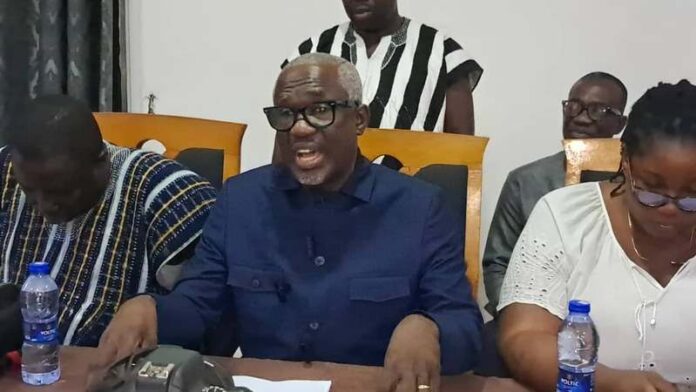In a defining moment for the future of the Volta Region, Dr. David Kofi Wuaku, a distinguished leadership expert and aspirant for the Council of State representative, has unveiled an ambitious plan to revolutionize the region through youth empowerment, technology-driven development, and strategic economic policies.
Addressing a press conference in Ho, Dr. Wuaku passionately articulated his vision to equip the youth with the skills and resources to compete globally, positioning the Volta Region as Ghana’s next innovation and entrepreneurship hub.
As the election on February 11, 2025, draws near, Dr. Wuaku is making a compelling case for his leadership, urging delegates to make a decision not for today, but for the long-term transformation of the region.
His mission is clear: to break the cycle of unemployment, harness the untapped potential of young people, and secure the Volta Region’s place in the digital economy.
Empowering the Youth Through Wealth Education and Technological Advancement
Dr. Wuaku’s vision is anchored on wealth education, an area he believes has been neglected for far too long. Drawing inspiration from successful welfare and insurance models in other parts of Africa, he is proposing a structured approach to financial security, particularly for those in the informal sector. His plan includes innovative insurance policies and pension schemes, ensuring that no hardworking individual in the region is left without financial stability in their later years.
At the core of his mission is technology-driven economic growth. He pointed out that the world’s wealthiest individuals today have built their fortunes not in factories, but in virtual spaces—through technology, innovation, and digital entrepreneurship. Dr. Wuaku is determined to give Volta Region’s youth a competitive edge in the digital world, establishing the region as a leader in software development, artificial intelligence, cybersecurity, and e-commerce.
“The richest people today are not those working long hours in offices, but those who understand technology, digital platforms, and virtual employment,” Dr. Wuaku stated. “We must wake up to this reality. The Volta Region must take its place on the global stage, just as India, Israel, and other nations have done.”
To achieve this, he has pledged to:
- Launch a competitive scholarship scheme for young people across all 18 assemblies in the Volta Region, focusing on IT education and digital entrepreneurship.
- Establish a state-of-the-art technology hub, where young people can learn coding, software engineering, cybersecurity, and digital business models.
- Develop a structured mentorship program, linking Volta Region’s youth to industry leaders, global investors, and top technology firms.
- Create a funding and investment ecosystem, where young innovators will receive capital, training, and business incubation support to turn their ideas into successful ventures.
This, he insists, is not just another political promise—it is a movement to future-proof the Volta Region and ensure that the next generation is not left behind in the global economy.
Transformational Leadership for a New Era
Beyond education and technology, Dr. Wuaku’s agenda includes a radical shift in leadership development. As a holder of a Doctorate in Business Leadership, he understands that true leadership is not about holding positions but about impact, influence, and creating tangible change.
His strategy for leadership transformation in the region includes:
- Developing a new generation of transformational leaders, trained to solve societal problems rather than just occupy political offices.
- Instilling the principles of selfless leadership, drawing inspiration from global icons like Nelson Mandela and Ghana’s own Jerry John Rawlings.
- Hosting regional leadership summits, where young leaders will be equipped with practical governance skills, policy-making expertise, and strategic decision-making capabilities.
“Leadership is not a title. It is a responsibility. If your leadership does not create change, then you have failed,” Dr. Wuaku emphasized. “The Volta Region needs leaders who will empower others, create jobs, build institutions, and leave a lasting legacy.”
A Call for Visionary Decision-Making on February 11
With the Council of State election set for February 11, 2025, Dr. Wuaku is urging delegates to make a choice that will secure the long-term transformation of the Volta Region. He warned against short-term political considerations, calling instead for a decision based on vision, experience, and the ability to mobilize resources and networks for the region’s growth.
“We cannot afford to make decisions based on short-term personal gain. This election is not about me—it is about the future of the Volta Region,” he declared. “We must ask ourselves: Who has the vision? Who has the network? Who has the ability to bring real development? That is the leader we must choose.”
Dr. Wuaku emphasized that under the NDC government, the Volta Region has an opportunity to leverage national influence to attract investment, infrastructure, and policies that benefit the people. His extensive networking experience at both national and international levels makes him the best candidate to strategically position the region for growth.
“I have spent 30 years building networks, negotiating deals, and creating opportunities. This is not about politics—it is about securing the future. If we do not take advantage of this moment, we risk being left behind for another generation.”
Conclusion: A Defining Moment for the Volta Region
Dr. David Kofi Wuaku’s campaign is more than just an election bid—it is a call to action for the Volta Region to embrace innovation, wealth creation, and transformational leadership. His vision, if realized, will not only equip young people with 21st-century skills but will also position the region as Ghana’s leading technology and business hub.
As the countdown to February 11 continues, he is making an urgent plea: “Let us make the right choice. Let us choose development over politics. Let us choose transformation over stagnation. Let us choose the future over the present.”
The decision now rests in the hands of the delegates—and with it, the future of an entire generation.

